Jeremie Averous's Blog, page 88
June 28, 2016
Why there is Debate Between Content Moderation and Free Speech
Moderation on social networks is an essential feature. In an excellent essay on the Verge ‘The secret rules of the internet – The murky history of moderation, and how it’s shaping the future of free speech‘, the relation to free speech is discussed. “As law professor Jeffrey Rosen first said many years ago of Facebook, these platforms have “more power in determining who can speak and who can be heard around the globe than any Supreme Court justice, any king or any president.'”
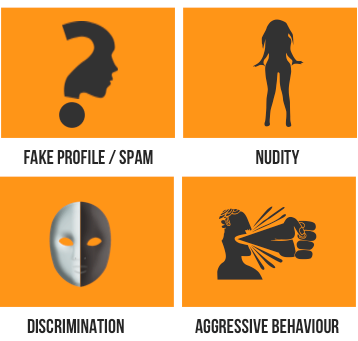 The testimonies about content moderation are quite breathtaking, and the decisions whether to keep some videos that have shocking content but are important from the political perspective (like the murder of people during demonstrations) an example of tough decisions to make.
The testimonies about content moderation are quite breathtaking, and the decisions whether to keep some videos that have shocking content but are important from the political perspective (like the murder of people during demonstrations) an example of tough decisions to make.
And because “The stakes of moderation can be immense. As of last summer, social media platforms — predominantly Facebook — accounted for 43 percent of all traffic to major news sites. Nearly two-thirds of Facebook and Twitter users access their news through their feeds“, this determines what people will ultimately see from the world.
Of course before there was journalism, a limited number of sources and effective censorship by governments. What has changed is that it is now privately handled and not susceptible to democratic control. I would anticipate that at some stage, guidelines might be defined by governments (e.g. related to anti terror campaigns) but at the moment it is an issue to be kept in mind.
Related posts: The dark little success secret of all social networks: heavy moderation (2012)

June 25, 2016
How Artificial Intelligence is Still Mostly Human-Sourced
There is a lot of buzz nowadays about Artificial Intelligence (AI) starting to be present in our lives: virtual assistants and else. However as this excellent article in Bloomberg shows ‘The Humans Hiding Behind the Chatbots‘, this AI is still very much human powered. We are not really talking only to a clever machine, but to a system that is still highly facilitated by humans.
 Like the chess machine, humans “turks” often hide behind Artificial Intelligence!
Like the chess machine, humans “turks” often hide behind Artificial Intelligence!AI will certainly become sometimes in the future a real feature in our environment. For the moment we mainly observe systems that do increase human productivity to respond to requests. The limit is fuzzy to a real AI system that is only being administered, but we can be on the safe side to affirm that real independent AI it not there yet.
In fact, numbers are not known precisely but moderation on all social networks is certainly one of the first tasks that could be handed over to AI and at the moment it is still very much human powered (using workers from low wage countries). And that may remain the most economic option for a while.
Related posts: How humans intervene in Internet’s workings (2013), The best digital maps are created by humans and crowd-sourced (2012)

June 23, 2016
How to Rate the Quality of a Decision in Complex Systems
Nassim Taleb, well known for his ‘black swan’ and complexity approach, writes “The quality of a decision cannot be based solely on its outcome“. This statement looks paradoxical but when you think about it, it is necessarily true in complex systems – because the future is unpredictable. It is quite wrong in situations where the outcome is a straightforward consequence of the decision (like deciding to hit one’s finger with a hammer or deciding to drive drunk).
 In complex systems, a lot of the outcome is due to chance. Some people even state that there is no such thing as an organization or personal strategy – there is just chance in life. Therefore, the outcome can’t obviously qualify the quality of the initial decision (and of the following ones) because it might be that we have been unlucky. Yet the decision might have been the best given the particular circumstances.
In complex systems, a lot of the outcome is due to chance. Some people even state that there is no such thing as an organization or personal strategy – there is just chance in life. Therefore, the outcome can’t obviously qualify the quality of the initial decision (and of the following ones) because it might be that we have been unlucky. Yet the decision might have been the best given the particular circumstances.
This is why there is no need to regret decisions taken in complex systems. Just move on. On the contrary one can regret eternally decisions taken in simple systems. The border between the two situations is not always easy to establish. And lessons learnt or learning becomes very difficult in complex systems without a clear causal link between a decision and the outcome.
In any case, the rating of a decision in a complex system should never been done in hindsight, but taking into account what was known or could have been known at the time of the decision. That is where many fail when condemning the remote consequences of past decisions. For example, when rating the decisions of a company CEO or of a government.

June 21, 2016
Why the Trend for Consulting Methods is Over-rated
In my consulting work I often observe that clients expect us to provide “consulting methods”. Actually it looks like our credibility would stem from having proprietary, proven consulting methods to address a large number of cases. However I feel that in a number of cases this should not be the most important concern from the client. Experience and capability to handle specific situations should be.
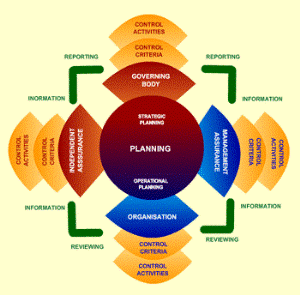 Another consulting method
Another consulting methodOf course it is important to have methods and to put on paper the lessons learnt from various interventions in a structured manner, that can be enriched over time. On certain aspects it is a definite indicator of effectiveness in a consulting intervention.
On other aspects I see to many “consulting methods” just developed to give some comfort to the client whereas ad-hoc approaches based on general principles would be the best response to the issue at stake. Even worse, applying those “methods” automatically will lead in a direction which might not ultimately resolve the actual issue of the client.
I consider that while having a few methods is essential, the client should also consider the level of experience and of human connection that the consultant brings to the table (in addition to providing an independent cold eye view of the situation). This is often all that is required, not the extensive application of a complicated analytical method.
I thus become suspicious when I encounter consultants that have methods for about everything: formatted by their methods, they might not look into the real issues at stake.

June 18, 2016
Why we need to focus on the prize
There seems to be much benefit of keeping our eyes on the long term prize (benefit) we are seeking so as to minimize the psychological impact of what we have to go through to reach it.
 Keep your eyes on the prize!
Keep your eyes on the prize!That’s what Valeria Maltoni expands on in her interesting post ‘How Small Differences in Perception can have Potentially Major Consequences‘. Experiments show that by keeping focus on the longer term benefits we get much more consistency in practice and more effort put into it: “we came up with a strategy that we called, “Keep your eyes on the prize.” So this is not the slogan from an inspirational poster. It’s an actual directive for how to look around your environment. People that we trained in this strategy, we told them to focus their attention on the finish line, to avoid looking around, to imagine a spotlight was shining on that goal, and that everything around it was blurry and perhaps difficult to see”
So let’s focus on the prize to reach it more effectively and avoid falling down at the first difficult moment!

June 16, 2016
Why Emotions Remain So Important in Organizations
Google is generally trying to use data to drive its performance. But it has found itself unable to predict the performance of teams based on data only. Actually it was more about emotional interactions. This research – the Aristotle project – is explained in a very interesting NYT article, ‘What Google Learned from Its Quest for the Perfect Team‘.
 “Project Aristotle is a reminder that when companies try to optimize everything, it’s sometimes easy to forget that success is often built on experiences — like emotional interactions and complicated conversations and discussions of who we want to be and how our teammates make us feel — that can’t really be optimized.”
“Project Aristotle is a reminder that when companies try to optimize everything, it’s sometimes easy to forget that success is often built on experiences — like emotional interactions and complicated conversations and discussions of who we want to be and how our teammates make us feel — that can’t really be optimized.”
As Hugh MacLeod (Gapingvoid) puts it, “Why is business so hard? Simply put, we think it is due to a lack of humanity. Our obsession with data is conflated with a belief that emotion in business is bad: Data and emotion are incompatible, so we have a bias against connecting emotion to business and we work in sterile workplaces that do not value our humanity.
But what happens, when the data support the paradox that it is our emotional connections that create better, more efficient, smarter work?”
Let’s develop emotional connection to create more efficient work.

June 14, 2016
What the Best Strategy in Complex Systems Is
“Stuart Kauffmann and John Holland, both complexity theorists affiliated with the multidisciplinary Santa Fe Institute, have shown that the evolutionary approach is not just another way of solving complex problems. Given the likely shape of these ever-shifting landscapes, the evolutionary mix of small steps and occasional wild gambles is the best possible way to search for solutions” writes Tim Harford in his book ‘Adapt: Why Success Always Starts with Failure‘.
 What I find extremely interesting in this statement is the affirmation that the evolutionary approach is the best way to deal with complex systems (in terms of survival), however this requires to be able to take some wild gambles from time to time, probably to adapt to the sudden changes that can occur in the environment.
What I find extremely interesting in this statement is the affirmation that the evolutionary approach is the best way to deal with complex systems (in terms of survival), however this requires to be able to take some wild gambles from time to time, probably to adapt to the sudden changes that can occur in the environment.
The thing is that evolution as a process is dramatically wasteful: a few survive but many don’t as nature proceeds with ongoing experiments. If it is indeed the best way to deal with complex systems it means that there is going to be a lot of waste, also known as failures.
This is actually the theme of the book, but leaves us with the need to manage a large number of experiments without if possible, dying as a result. We thus need to develop a particular manner of evolution which remains survivable.
Still, in our complex world, we could learn more from evolutionary theory than we generally think.

June 11, 2016
What Happiness Is Actually About
I can’t resist to share a quote that moved me from Om Swami’s blog, itself a quote from the author Will Durant.
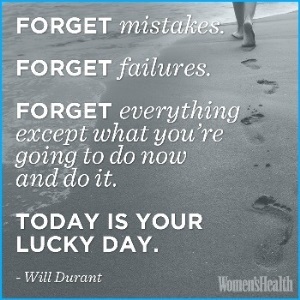 “Many years I sought happiness. […] I perceived that if I will do as well as I can the tasks for which life has made me, I shall find fulfillment, and a quiet lane of happiness for many years. Gladly I surrender myself to nature’s imperative of love and parentage, trusting to her ancient wisdom, and knowing that, as Dante learned when he entered Paradise, “La sua volontade è nostra pace — in her will and service is our peace””
“Many years I sought happiness. […] I perceived that if I will do as well as I can the tasks for which life has made me, I shall find fulfillment, and a quiet lane of happiness for many years. Gladly I surrender myself to nature’s imperative of love and parentage, trusting to her ancient wisdom, and knowing that, as Dante learned when he entered Paradise, “La sua volontade è nostra pace — in her will and service is our peace””
Om Swami concludes: “Each one of us has a certain purpose. It can’t be and is not the same for everyone. Sometimes, we keep battling for a different life, hoping that we’ll have a life of our dreams by clearing all the hurdles in our present life.
The truth is, if Nature has given you a certain strength, talent, capability, whether you like it or not, it’ll put it to maximum use. No matter where you go or what you do, it’ll pull you back into your natural play field where you add the greatest value to its functioning and apparatus.”
Thus we’ve been warned and gently guided to find our happiness.

June 9, 2016
How Mobile is Eating the World
Mobile is eating the world, and the proof is in a quite famous presentation by Benedict Evans from the Venture Capital firm Andreessen Horowitz which has been updated in 2016.
I share here some highlights which have particularly struck me.
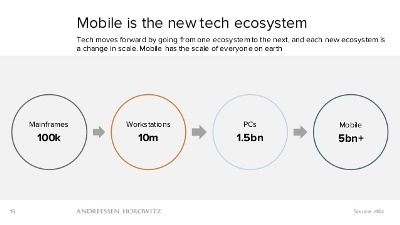 Mobile represents a 10x increase in the number of users
Mobile represents a 10x increase in the number of usersFirst, mobile will represent a roughly 5-10x increase in the number of users and devices compared to the previous ecosystems, and is quite comparable to the move to personal PCs, as shown in the figure on the right. And this means everyone has a super computer in his/her pocket. The presentation goes on to argue that this will also lead to a significant increase of productivity. That might be true in theory, but I think this can be controversial as mobile devices are also a great source of lost time! (ref our post on How Mobile Phones Distract Us – A Real Life Example).
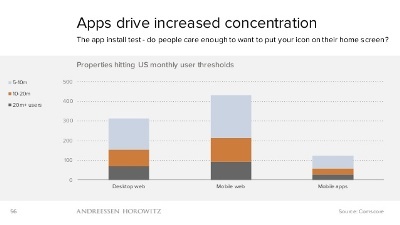 Mobile apps lead to a concentration of valuable online properties
Mobile apps lead to a concentration of valuable online propertiesMobile is an ecosystem and actually most people use apps to access the data of the internet. What happens is that actually, people don’t use a lot of apps on their mobile devices, hence there are much less valuable online properties, but they are quite more valuable. Actually one third of the users access the internet through Facebook!!
Finally, we are just at the beginning of the disruption brought by mobile devices in the business models that pervaded the world before, so hold on!
The full presentation is available below:
Mobile Is Eating the World (2016) from a16z

June 7, 2016
How to Develop Emotional Responsibility
Marshall Rosenberg in the book ‘Non violent communication‘ explains that “In the course of developing emotional responsibility, most of us experience three stages:
“emotional slavery”— believing ourselves responsible for the feelings of others,
“the obnoxious stage”— in which we refuse to admit to caring what anyone else feels or needs, and
“emotional liberation”— in which we accept full responsibility for our own feelings but not the feelings of others, while being aware that we can never meet our own needs at the expense of others.“
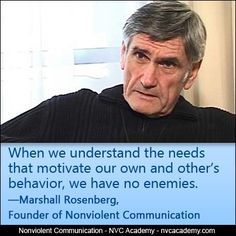 Emotional responsibility is essential to respond to deeply conflicted and emotional situations. I like this description of those three stages because of their clarity and how they relate to my own experience. I am not always emotionally liberated but at least I can see how to reach that level.
Emotional responsibility is essential to respond to deeply conflicted and emotional situations. I like this description of those three stages because of their clarity and how they relate to my own experience. I am not always emotionally liberated but at least I can see how to reach that level.
Taking responsibility for our own feelings is in my view the essential piece here. Being able to do that is the key in reaching inner peace and responding adequately to stressful situations where tempers flare.
How do you take responsibility for your own feelings and at the same time acknowledge the feelings of others, being ’emotionally liberated’?




